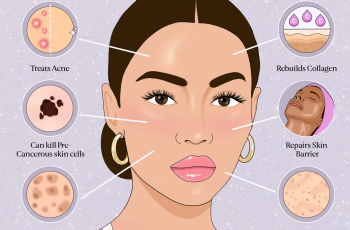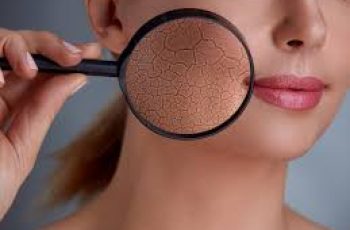
Aging is a natural part of life, but the changes it brings to your skin—like fine lines, sagging, dryness, and uneven tone—don’t have to feel inevitable.
The right skincare routine, built on effective and science-backed ingredients, can help you maintain healthier, younger-looking skin for years.
But here’s the truth: The skincare market is crowded with products claiming to turn back the clock.
From anti-wrinkle serums to firming creams, it’s hard to know what truly works—and what’s just expensive hype.
This guide will help you cut through the noise. Below, you’ll learn about the most researched, dermatologist-approved anti-aging ingredients, how they work, and which might be best for your skin type.
Understanding Anti-Aging Skincare Ingredients
There are two major factors to consider when choosing anti-aging ingredients:
Scientific evidence supporting their effectiveness.
Suitability for your specific skin type (Baumann Skin Type®, if applicable).
Whether you’re in your 20s, 40s, or beyond, the earlier you understand your skin and choose the right ingredients, the better your results will be over time.
What Makes an Ingredient “Anti-Aging”?
Anti-aging ingredients aim to slow or reverse the visible effects of aging. This includes:
Smoothing fine lines and wrinkles
Improving skin elasticity and firmness
Boosting collagen and elastin
Brightening and evening skin tone
Fighting free radical damage
Supporting skin cell turnover and repair
Many of these ingredients either hydrate the skin temporarily or stimulate long-term structural improvements.
The 4 Best Anti-Aging Ingredients (Backed by the Most Research)
These ingredients are widely regarded by dermatologists as the most effective in fighting skin aging:
1. Exosomes
Exosomes are nano-sized vesicles that play a major role in cell communication. In skincare, exosomes may help regenerate skin cells and promote healing and collagen production.
Research is still emerging, but early results are promising.
2. Retinoids (Including Retinol)
Retinoids are derivatives of vitamin A that increase cell turnover and stimulate collagen. This makes them incredibly effective at reducing wrinkles and preventing future signs of aging.
3. Sunscreen
No anti-aging routine is complete without sunscreen. UV rays are the #1 cause of premature aging. Daily use of SPF 30+ protects against fine lines, age spots, and even skin cancer.
4. Vitamin C (Ascorbic Acid)
Vitamin C is a potent antioxidant that brightens the skin, reduces pigmentation, and supports collagen synthesis. It also helps neutralize damage from free radicals caused by pollution and UV exposure.
Popular vs. Proven: A Warning About Pseudoscience in Skincare
Skincare companies often use pseudoscience—claims that sound scientific but aren’t backed by real research—to sell products. These include:
Unproven elastin-boosting claims (you cannot increase elastin through topicals)
Temporary “firming” from coatings that don’t change the skin structure
Exotic ingredients with little to no clinical evidence
Always look for peer-reviewed studies, not just marketing promises.
Top 10 Trending Anti-Aging Ingredients (That Actually Work)
You may have seen these ingredients on TikTok or beauty blogs. Many do offer benefits—but remember, effectiveness depends on your skin type and how you use them.
Growth Factors – Proteins that stimulate collagen and cell regeneration.
Hyaluronic Acid – Hydrates and plumps the skin for a temporary youthful look.
Peptides – Support collagen and elastin for firmer skin.
Retinoids – The gold standard in wrinkle reduction.
Vitamin C – Brightens and repairs.
Green Tea Extract – A natural antioxidant rich in polyphenols.
Resveratrol – Another antioxidant found in grapes and berries.
Heparan Sulfate – A humectant that also supports wound healing.
Argireline – A peptide often called “Botox in a bottle.”
TriHex Technology – A blend designed to clear cellular waste and support skin renewal.
These ingredients may work best when used in combination—some for quick results, others for long-term repair.
8 Categories of Effective Anti-Aging Ingredients
These categories help explain how various ingredients work to slow aging:
Anti-inflammatory ingredients – Calm redness and irritation.
Antioxidants – Fight oxidative stress from pollution and UV rays.
Autophagy enhancers – Promote cell cleanup and renewal.
Cellular senescence reducers – Reduce “zombie” cells that speed up aging.
Defensins – Signal skin stem cells to regenerate.
DNA Repair Enzymes – Fix UV and pollution-induced damage.
Retinoid receptor activators – Stimulate collagen and renewal.
Sun-protection agents – Prevent damage before it starts.
Natural Anti-Aging Ingredients That Actually Work
Many natural compounds offer real anti-aging benefits. Here are a few backed by science:
Bakuchiol – A natural retinol alternative with similar effects but less irritation.
Green Tea (EGCG) – Rich in polyphenols that protect and soothe.
Licorice Root – Brightens and reduces dark spots.
Resveratrol – Found in berries and grapes, helps reduce oxidative damage.
Aloe Vera – Soothes, hydrates, and supports healing.
Soy Isoflavones – Improve elasticity and reduce pigmentation.
Natural Anti-Aging Oils
Plant-based oils offer antioxidant and moisturizing benefits. Great for dry or aging skin types:
Argan Oil – High in vitamin E and essential fatty acids.
Rosehip Oil – Contains vitamins A and C, great for texture and tone.
Jojoba Oil – Mimics natural skin oils and provides antioxidant support.
Pomegranate Seed Oil – Full of punicalagins, strong antioxidants.
Tamanu Oil – Known for healing and anti-inflammatory effects.
Choose oils based on your Baumann Skin Type® for best results.
Insect- and Reptile-Derived Ingredients: Trendy But Controversial
Some brands market exotic ingredients like:
Bee Venom – May stimulate collagen, but risks irritation.
Snail Mucin – Contains hyaluronic acid and glycolic acid, good for hydration and repair.
Syn-Ake (Synthetic Snake Venom) – Claims to relax muscles, mimicking Botox.
Silk Protein – Offers hydration and a smooth skin finish.
These can be expensive and lack strong clinical support. Glycerin or hyaluronic acid may offer similar effects at a lower cost.
When to Start Using Anti-Aging Skincare
There’s no “perfect” age to start anti-aging skincare. Prevention is better than correction, so starting in your 20s or early 30s is ideal.
What matters more is your skin type. For example:
Oily, acne-prone skin may tolerate retinoids earlier.
Dry, sensitive skin might benefit from ceramides and gentle peptides first.
Pigmented or uneven skin tone may need antioxidants like vitamin C or licorice root.
How to Find the Best Anti-Aging Products for You
It’s not about using all the ingredients. It’s about finding the right combination for your unique skin needs.
That’s where tools like the Baumann Skin Type® system come in. After taking a simple quiz, you’ll receive a custom skincare routine based on:
Skin sensitivity
Oil production
Pigmentation
Wrinkle tendency
Final Tips for Anti-Aging Success
Use sunscreen daily—no exceptions.
Combine short-term and long-term benefit ingredients.
Introduce active ingredients slowly to avoid irritation.
Be patient—visible changes may take weeks or months.
Don’t fall for “miracle” claims without science to back them up.
Top Takeaway: The 5 Best Anti-Aging Ingredients
Retinoids – Proven wrinkle fighters
Vitamin C – Brightens and protects
Sunscreen – The ultimate age-prevention tool
Exosomes – Cutting-edge regeneration support
Hydroxy Acids – Resurface and renew the skin


